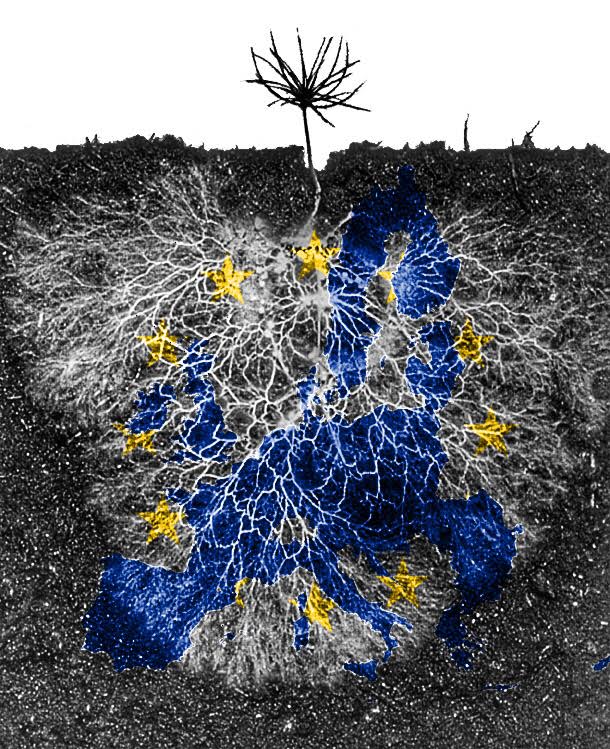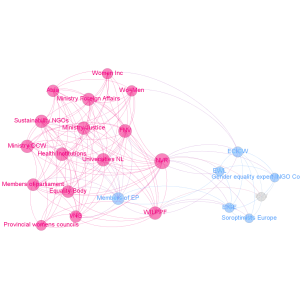Civil society organizations provide an important watchdog mechanism in the European policy process. Based on her study on what drives information exchange regarding the implementation of EU gender equality law in practice, Reini Schrama draws three important lessons from the monitoring network of women´s groups in the Netherlands. The aim of monitoring is to gather information and gain access to valuable sources and this requires swift, brokered and broad-based information exchange. Because of this distinct functionality, monitoring networks benefit from a structure of interactions that allows information to spread rapidly across different parts of the network, no matter the preferences or the organizational background of the actors involved.

The implementation and enforcement of EU Directives is a multi-level game. Member states have to transpose EU law, prepared by the EU Commission and agreed upon collectively, into national legislation and are responsible for their actual implementation in the domestic context. The EU Commission supervises the implementation process to make sure Member States comply with EU requirements. Although the EU´s enforcement powers may be expanding through the network linkages among national authorities, it traditionally relies heavily on a decentralized monitoring system by fire-alarm. Local actors can monitor implementation informally by assessing whether targets are actually met and provide information on incorrect applications whenever there is a problem. Though the importance of monitoring by local actors to help enforce compliance is widely acknowledged, little is known on how these actors organize their monitoring activities and what determines effective information exchange.
To monitor whether key concepts of EU law are implemented in practice, relevant Civil Society Organizations (CSOs) need to engage with a variety of stakeholders. First, civil servants and political actors collect background information, regularly review priorities and reflect on activities in relation to policy implementation. Second, transnational CSOs can provide input for the data collection process, report on implementation efforts across the EU and widely distribute information. Third, local CSOs can provide specific knowledge and feedback on the concrete impact of policies in practice. Lastly, independent research institutions contribute through extensive data collection and external evaluations.
At the end of the day, organizations monitoring policy implementation are in need of a network that allows them to keep track of all developments in the policy process and detect implementation problems immediately. To gain access to this type of information, organizations must exchange information rapidly and among a diverse set of actors. In this context, the types of interactions that add the most value are the ones that increase the connectivity of the network resourcefully, broker between different parts of the network and do not discriminate against different kind of actors. Information exchange in a monitoring network is therefore driven by efficiency, brokerage, and diversity. These kind of bridging interactions are particularly relevant for networks monitoring the implementation of multi-level policies attracting stakeholders active on different levels.
To demonstrate how these monitoring networks are structured and what drives information exchange, I have mapped out the network of a key civic actor when it comes to monitoring EU gender equality law in domestic practice. The Dutch Women´s Council (Nederlandse Vrouwenraad) brings together women´s groups in the Netherlands and represents them within the European Women´s Lobby. An inferential network analysis allowed me to test what increases the likelihood of information exchange and provides us with three important lessons for civic actors setting up their monitoring activities (read more about the study here).

Monitoring network of the NVR (Dutch Women´s Council); violet is domestic, blue is European and grey is international level.
Lesson 1: Do not discriminate
First, diversity is key when it comes to information exchange to monitor policy implementation. In contrast to more general collaboration, a similarity in preferences, mutual objectives, and compatible organizational backgrounds are unlikely to drive information exchange for the purpose of monitoring. Monitoring benefits from actors gathering as much valuable information as possible from a variety of sources.
Different kind of actors will process and value information according to their distinct perspectives, leading to more broad-based monitoring. Information exchange for the purpose of monitoring entails sharing detailed information and specific knowledge about the concrete impact and implementation of policies. This type of information is often shared by research actors and CSOs and put to use through access relations with state actors. Monitoring by fire-alarm assumes interaction between societal actors and governmental actors to get full information on implementation practices at those in the position to do something about it. Information is likely to be dispersed among actors with divergent preferences on implementation strategies. In addition, CSOs rely on the information resources produced by research actors. When you are dependent on the resources of others, as is the case in a monitoring network, linking up to others is a necessity, no matter the differences in preferences. As a result, monitoring the implementation of external rules requires a network that includes different perspectives in order to gain full information on the process of implementation.
Lesson 2: Connect different worlds
Another mechanism driving access to new information is brokerage. Brokers essentially create indirect relations where there are no direct ones and thereby increase the flow of information and connectivity of the network. In the context of a monitoring network, brokers can connect actors with a distinct focus on the implementation process and different pools of information. The ability to establish contacts with actors and organizations from various parts of the network is particularly important for monitoring, as it provides an opportunity to access information that is different from what is already circulating. A monitoring network requires information to flow freely, so that problems can be detected in every phase and in each aspect of the policy process. As a result, in order to fully monitor policy implementation, you have most control when you are in the valuable position to bridge parts of the network that are otherwise unconnected.
Brokers are essential in multi-level monitoring networks to improve coordination of collective action and bring together actors from different polity-levels to help them understand implementation problems with common terms of reference.
Lesson 3: Use your connections wisely
Finally, by using exchange relations efficiently, you gain greater access to external information and resources. Monitoring entails detecting implementation problems whenever they occur, so connections that bring in information that is unknown, even to someone’s close relations, are the most advantageous. To save the costs of the additional link that will not lead to new information anyway, actors tend to exchange information with those that do not have overlapping sources of information. When in need of swift access to novel information, try to exchange information with those that provide new connections. This way, you can reach and gain insights from a higher number of actors in the network and learn about information that is different from your own pool of knowledge.
Summing up, especially when policy implementation is a multilevel and inter-organizational task, such as in the case of the EU policy process, successful implementation requires networked communication and exchange of resources. To effectively increase transparency in the implementation process, actors that monitor policy implementation should use their network differently than in more collaborative settings. Instead of building trusted partnerships with like-minded parties to push a certain policy forward, in a monitoring network policy stakeholders benefit more from letting information flow freely at low cost, brokering information between different parts of the network and facilitating information exchange among a diverse set of actors with divergent preferences.
